| | This weekend, a case for optimism on climate change, the unique Berlin dialect of English, and how T͏ ͏ ͏ ͏ ͏ ͏ |

Ben Smith |
Welcome back to Flagship Weekend! Hollywood is shutting down this weekend, and possibly for month, in part over screenwriters’ fears over artificial intelligence. But it’s still early to figure out where the real promise and peril of the new large language models lie – and how the humans will abuse it. Here’s an example Reed Albergotti reported this week. A company that built a human-looking avatar on top of ChatGPT had its access to a service-provider cut off because users were trying to make the blonde, female character act inappropriately. The video is wild. Also this week, Louise Matsakis got the scoop on how the House of Representatives China committee is investigating two popular Chinese online-shopping sites, Tim McDonnell dug into worries of a “meat bubble” driven by climate change, and Dave Weigel spotted the latest trend in global politics: successful new campaigns against porn. And if you’re looking for some reassurance that the humans occasionally figure things out, Tom has some (relatively) good news about progress in fighting climate change. Then I hope you can put down your phone and enjoy the time off! — Ben Smith, Editor-in-Chief |
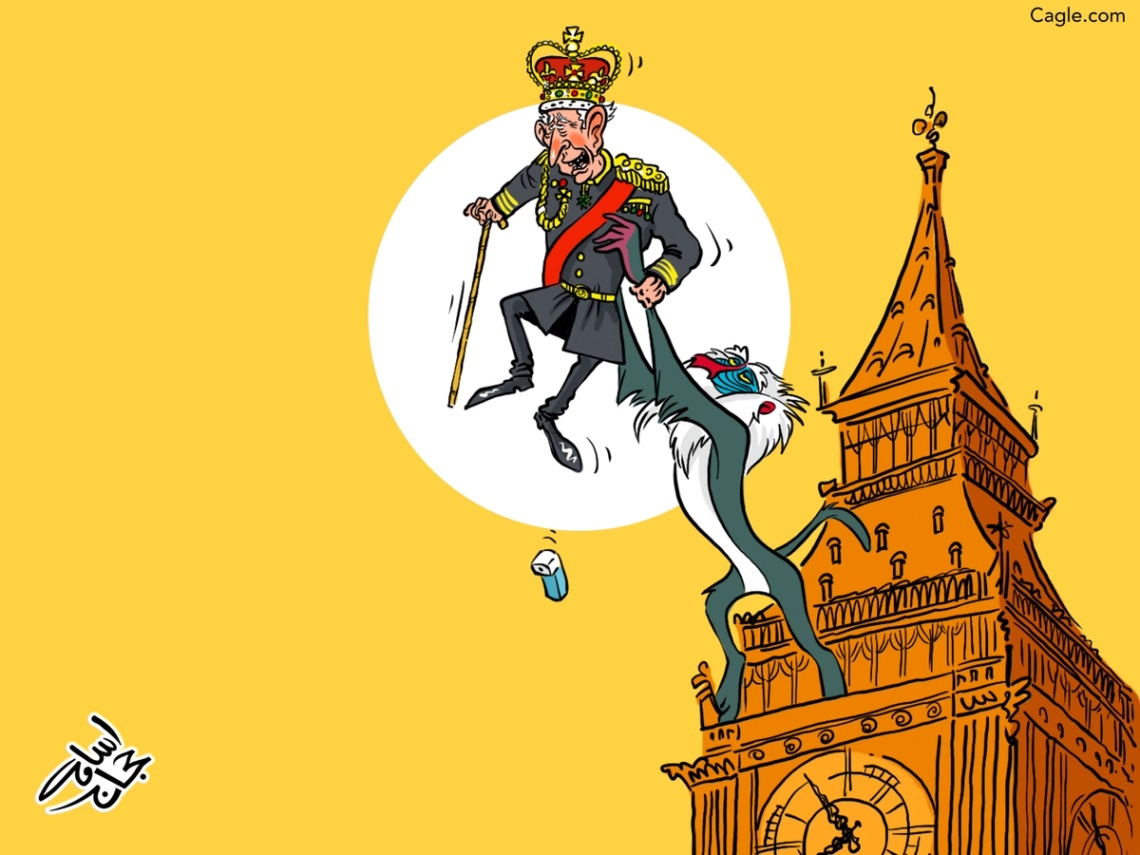 King Charles Coronation by Osama Hajjaj, Jordan King Charles Coronation by Osama Hajjaj, Jordan |
|
 Serge Gainsbourg at home in Paris. Jerome Prebois/Kipa/Sygma via Getty Images Serge Gainsbourg at home in Paris. Jerome Prebois/Kipa/Sygma via Getty ImagesFrench singer Serge Gainsbourg’s Paris home — which he temporarily shared with lover Brigitte Bardot and wife Jane Birkin — has been described as the “devil’s nightclub,” owing to its almost entirely black interiors, and the bizarre regalia that decorates it, including a stuffed tarantula and a detailed human model. “This is my house,” Gainsbourg said in 1979. “And I don’t know what it is: a concert hall, a brothel, or a museum.” The immaculately preserved house, which was so eerie that Birkin would feel afraid of staying there alone, is due to open to the public this year.  Istanbul Modern Art Museum/Instagram Istanbul Modern Art Museum/InstagramThe Bosphorus embankment has a new architectural marvel. The outline of the Istanbul Museum of Modern Art “evokes ships of different sizes traveling back and forth between Europe and Asia,” according to the studio of its designer, Pritzker-winning architect Renzo Piano. Very much a product of its environment, on the roof of the museum is a reflective pool that acts as an extension of the Bosphorus. The Modern, part of a $1.7 billion regeneration of Istanbul’s port area, opened this week with a show by Turkish photographer Nuri Bilge Ceylan, and will house a collection with works by renowned contemporary artists including Olafur Eliasson and Tracey Emin. English is so ubiquitous that non-English speaking countries often incorporate English words into their own lexicon. In Berlin, the melding of German and English has led to a distinct dialect — one in which words like spontaneously take on new meaning, German newspapers describe a political drama as ein Shitstorm, and you can overhear people at cafes saying Oh my God was für ein Fuck-My-Life-Moment. It contains a number of “pseudo-anglicisms,” or phrases made up of English words that don’t make sense in English, like a Shooting (a photo shoot), a Dressman (a male model), and a Bodybag (a satchel). “Why consider languages as rivals,” Alexander Wells writes in The European Review of Books. “The longer I live between languages, the more I realise that language is roomy; people’s minds, and lives, are roomy.” |
|
The case for some climate optimism |
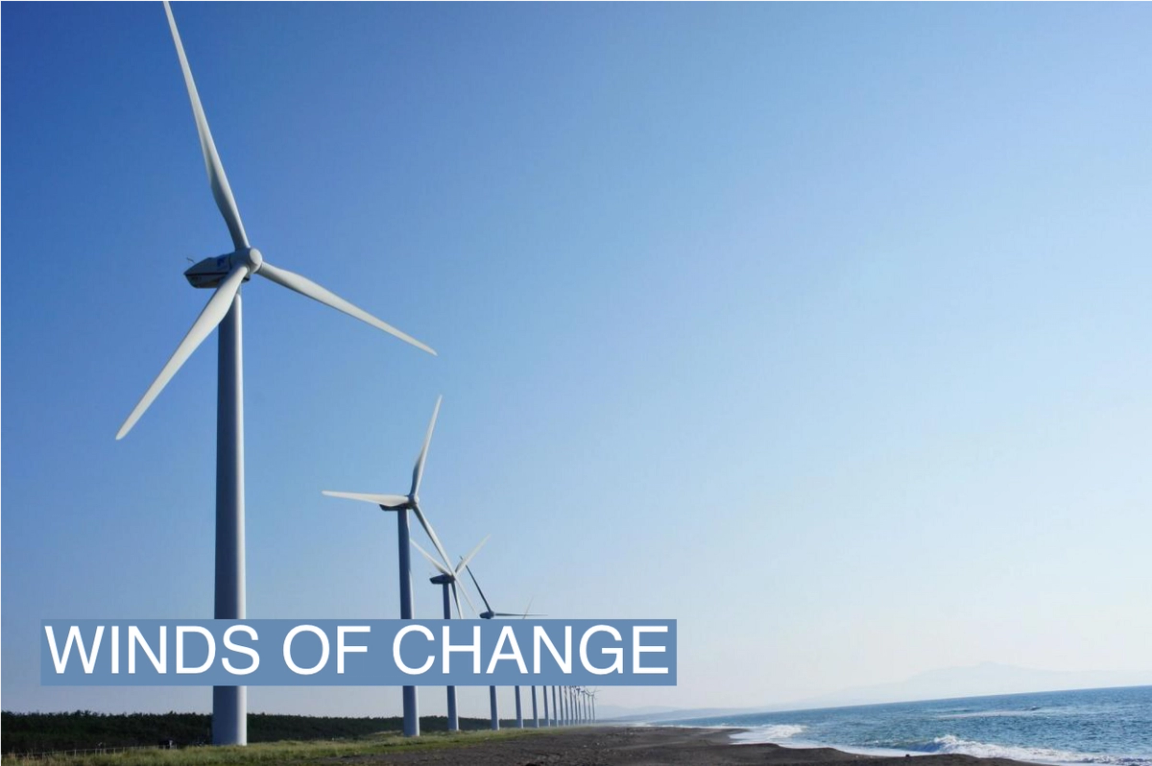 Pxfuel PxfuelTHE NEWS Climate change is one of the world’s most pressing problems, and no one is more worried about it than the young. Nearly three-fifths of Americans under 35 say climate change is a direct threat to them, and almost half say they worry a great deal about it, according to a recent Gallup poll. Global research shows even starker figures. A 2021 survey of 10,000 young people, aged 16 to 25, found that 84% were at least somewhat worried. Around half said they felt “sad, anxious, angry, powerless, helpless, and guilty” and that it negatively affected their daily life. And 39% said they were worried about having children, given the state of the world they would be born into. Climate change is already driving droughts and famines in parts of Africa, floods last year in Pakistan, as well as fast-changing weather patterns in the West. The Horn of Africa has seen its worst drought in 40 years, and has more than 4 million people in need of humanitarian assistance. It’s also true that the world is on course to miss the 1.5 C target of warming, agreed at the 2015 UN Climate Change Conference in Paris. TOM’S VIEW Young people, especially those in richer countries, can afford to be more optimistic about the future. There are lots of good-news stories about climate change which don’t get the attention they deserve. Things really have moved in the right direction. One of my very favorite examples is the graph showing the cost of solar panels. Back in 1975, each watt of additional solar capacity cost $100. By 2010, that was less than a dollar. Now it’s 27 cents. Current solar prices are way below what IPCC models predicted they would be in 2050. The price of lithium-ion batteries per kilowatt-hour, meanwhile, fell by 97% between 1991 and 2018. They’re also longer-lasting and higher capacity than they used to be. 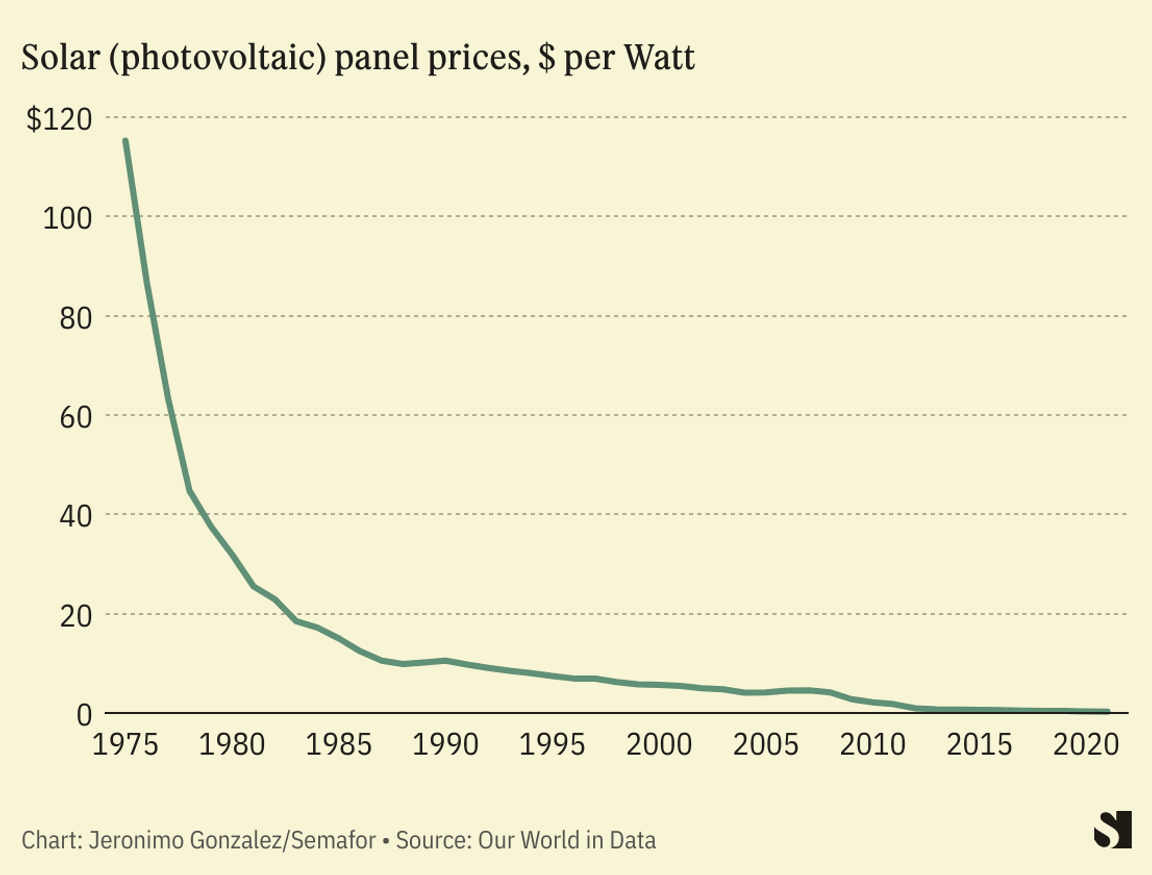 All that green energy is going to good use. The electric vehicle industry is booming: In 2006, just one in 500 cars sold were electric or plug-in hybrids. Last year, it was more than one in eight, worldwide. The International Energy Agency estimates that by the end of the decade, one in three cars sold will be electric. And the progress has had an effect. Not long ago, it was realistic to worry that the world might see 4 C of warming, or more. But now, given the trends I’ve outlined, and the existing policies of world governments, the Climate Action Tracker, an independent scientific body which evaluates climate policy impacts, thinks the most likely outcome is 2.4 degrees. In 2018, existing policies led to between 3.1 and 3.7 degrees of warming. To be clear: 2.4 degrees isn’t good. It’ll mean changing weather patterns, leading to more droughts and more floods. It’ll mean heatwaves and rising sea levels, and very possibly the disappearance of some entire island nations. It will probably mean tens or hundreds of thousands of deaths a year more than there would be in a world without climate change. But it probably won’t mean the collapse of society in the lifetime of today’s young people. Overall, as the world has become richer and more technologically advanced, we’ve become more able to feed people, despite a growing population, and, perhaps more surprisingly, deaths from natural disasters have drastically dropped, too. Climate change will slow that progress, but it’s unlikely, as it stands, to reverse it. It’s really important for young people to be aware of this progress. Scientists have been warning of the dangers of climate change since before I was born. Imagine how disheartening it must be if you believe that, after all that time, all that effort, all those billions of dollars spent, nothing had changed. It would be awful. Believing the worst isn’t helpful for activism, either. As Our World in Data’s Hannah Ritchie pointed out recently, people who believe we’re definitely doomed achieve the same thing as people who believe climate change isn’t happening: Inertia. The actual reality — that human ingenuity, government policies, and global activism have made a real difference — is a far greater call to action. ROOM FOR DISAGREEMENT Climate forecasts are uncertain. One key issue is feedback effects. For instance, if a warming world causes more clouds, then they will reflect more sunlight back into space. That would slow warming down: A negative feedback. Or, a warming world might cause more water vapor in the atmosphere, which would trap more heat and accelerate warming: A positive feedback. The most likely scenarios at the moment seem to be bad, though not devastating, warming. But if there are unforeseen positive feedback loops, that could be completely wrong. That’s why keeping warming as low as possible is still important. NOTABLE - You shouldn’t have to set the bar for worrying about climate change at “human extinction” or “societal collapse,” the politics writer Matthew Yglesias argues. The fact that it will cause humanitarian disasters such as droughts and floods in poorer countries is reason enough to try hard to avert it.
|
|
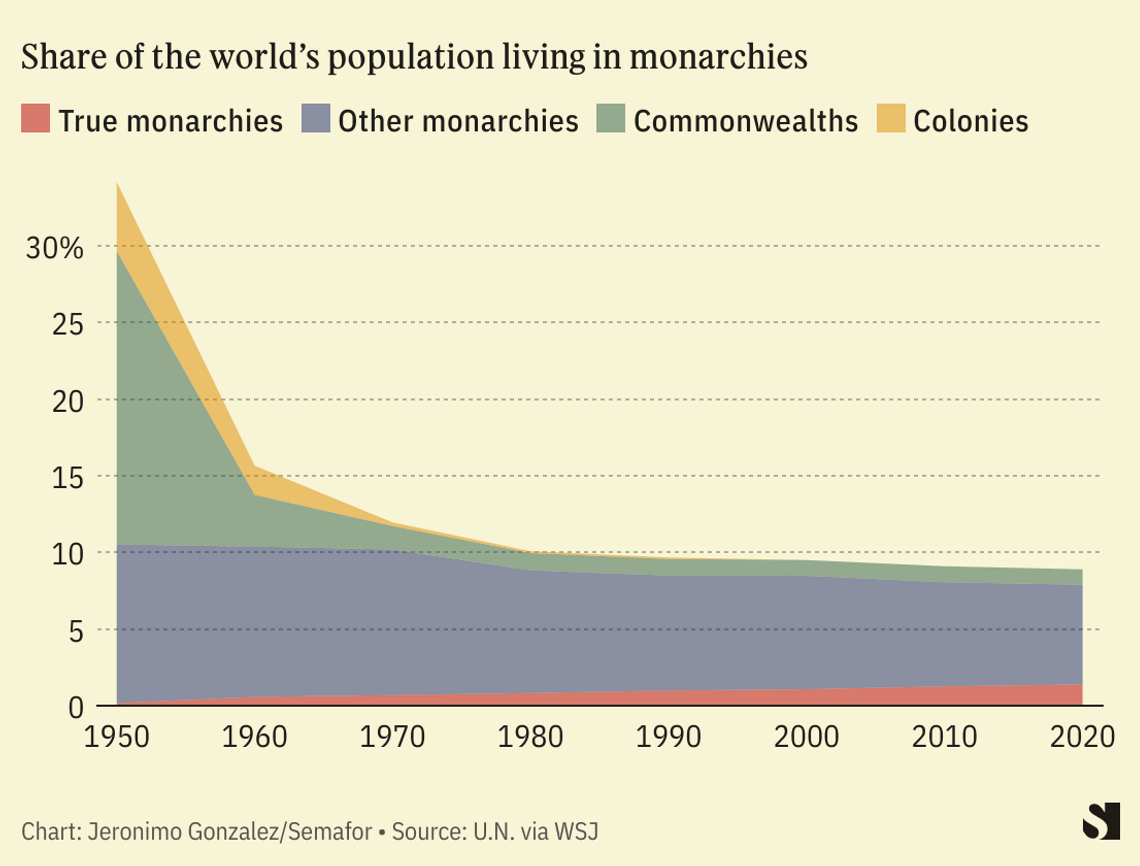 When King Charles was born, roughly 35% of the world’s population lived under some form of monarchy. By the time of his coronation today, just 9% do. Although various types of political systems function under monarchies — including constitutional monarchies such as the U.K. and Japan’s — 14 true monarchies, where the head of the royal family wields political and economic power, still remain: Bahrain, Bhutan, Brunei, Eswatini, Jordan, Kuwait, Liechtenstein, Monaco, Morocco, Oman, Qatar, Saudi Arabia, Tonga, and the United Arab Emirates. However, these make up just 1.4% of the world’s population and just under 2% of the world’s GDP, according to The Wall Street Journal. |
|
 - U.S. lawmakers are questioning Nike, Adidas, and two Chinese online-shopping platforms about ties to forced labor in China, Louise Matsakis reports.
- It turns out U.S. President Joe Biden’s Inflation Reduction Act will cost more than expected — maybe a lot more. That’s a good thing, Jordan Weissman writes.
- Botswana’s acquisition of a major stake in a Belgian diamond company will disrupt the global diamond business. Yinka Adegoke reports on one of the most ambitious attempts by an African country to move beyond extracting minerals to adding more value.
|
|
Recent progress in artificial intelligence has been astonishing. Only a few years ago, it was impressive if AI systems could even tell pictures of cats from pictures of dogs: Now, they can write poetry, write computer code, create astonishing imagery. Flagship’s lead writer Tom Chivers texted with Nicklas Lundblad, Head of Global Policy and Public Affairs at Google DeepMind, about what will surprise us next in the world of AI. 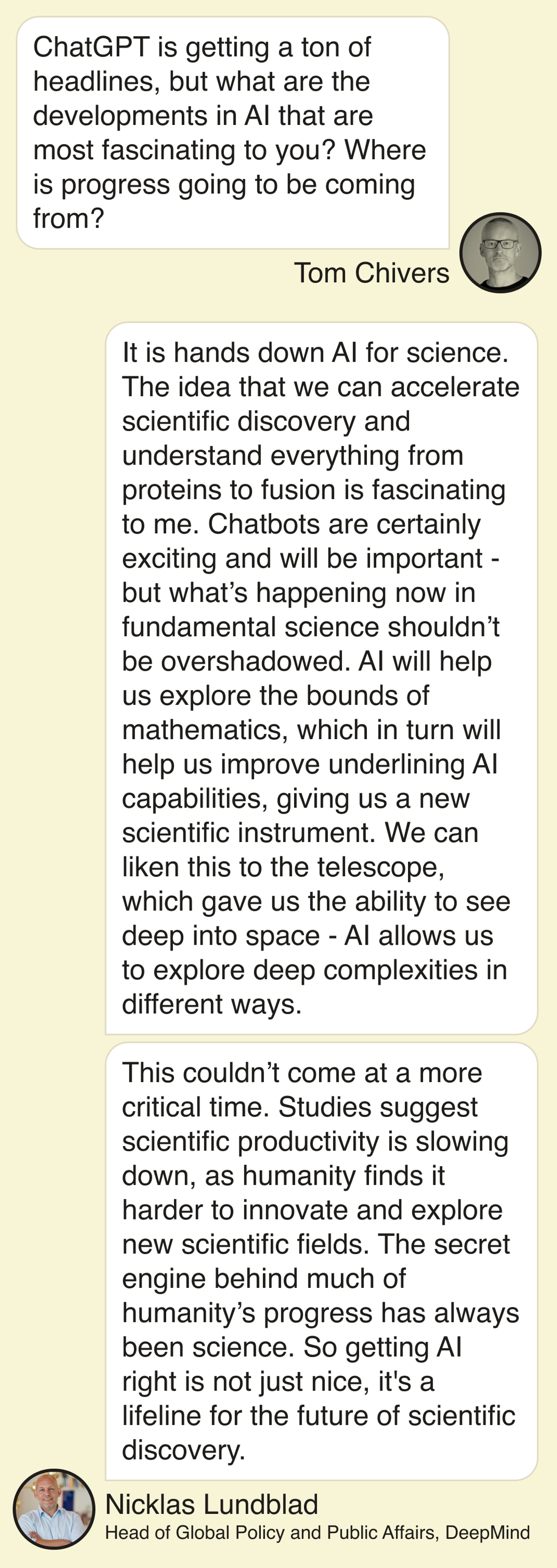 |
|
 Squaremeal/WikimediaCommons Squaremeal/WikimediaCommonsTexas barbecue was once a predictable cuisine, but as the state has become more diverse, its staple style of food has followed suit. Texas barbecue is itself the creation of waves of different types of people — from Indigenous Caddos, to Spaniards, to Tejanos, Black Texans, and then Germans and Czechs. Among the newer takes is halal Pakistani, Vietnamese-Persian, and Tex-Ethiopian. One restaurant is a combination izakaya and smokehouse, an Egyptian food truck offers pomegranate molasses-glazed ribs, and a San Antonio spot offers Southeast Asian rice bowls with smoked brisket. “It’s not just a bunch of cowboys making barbecue,” one Vietnamese-Texan chef told Atlas Obscura. “It’s people that look like me.” |
|
If you enjoyed Flagship, please share it with your family, friends, and colleagues — it makes a big difference to our mission to cover the world with intelligence and insight. To make sure Flagship hits your inbox every day, add flagship@semafor.com to your contacts. In Gmail, drag our newsletter to your “Primary” tab. You can always reach us on that address, or by replying to this email. We’d love to hear from you! Thanks for reading, and see you next week. — Tom, Prashant Rao, and Jeronimo Gonzalez. Want more Semafor? Explore all our newsletters at semafor.com/newsletters |
|
| |